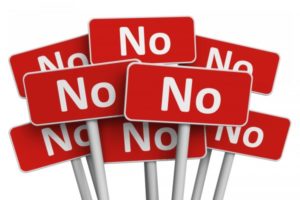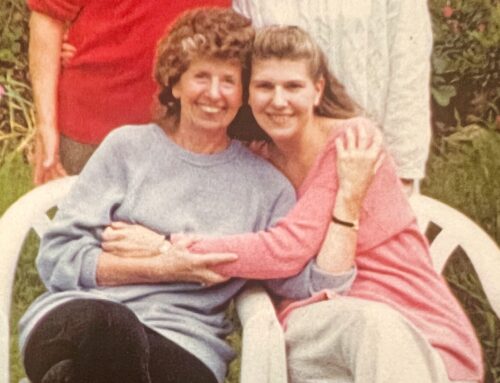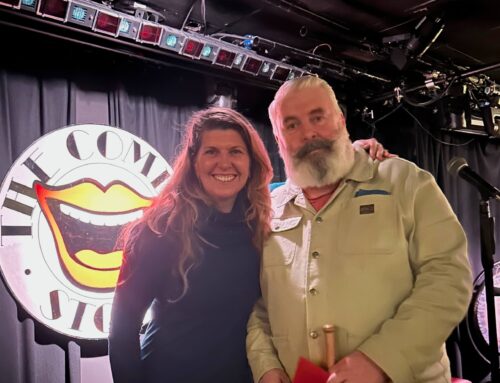That’s ‘should-ing’, in case you were wondering.
Sometimes we’re so hard on ourselves aren’t we? We tell ourselves we shouldn’t have said that, we should be better at something, we shouldn’t have eaten that, we should have been kinder to someone, we should have understood something that we didn’t – our list of ‘should-ing’ all over ourselves is endless.
‘Should-ing’ on ourselves

Photo Credit: Oleksiy Mark/Shutterstock
What happens when you listen to that voice that tells you should or should not have said or done something? I’m betting that you do one of the following:
- Start justifying in your head why you did / didn’t do or say it
- Have an argument with yourself
- Beat yourself up
- Declare to yourself you will never do such a thing from this day henceforth (until you do, then you repeat 1-3)
Productive, eh? Super unhelpful too!
Situational ‘should-ing’
This is what happens when we believe that something should or should not have happened e.g. we get fired, someone we care for gets sick, a rail crash occurs, we didn’t get the pay rise we were expecting etc.
What typically happens when we believe that something should or should not have happened is that we feel bad. It can feel like our day (week / month / year / life) has been ruined because of this external thing. But is this really true? Can we know for certain that this isn’t exactly what was meant to happen? That in fact something good may come out of this situation if we search for it?
The thing is, when we ‘should’ about it, it doesn’t make the situation any better and it doesn’t make us feel any better, yet we still allow these ‘shoulds and ‘should nots’ to go unquestioned in our minds, leaving us feeling like a victim of our circumstances.
‘Should-ing’ on them
You might be okay with should-ing all over yourself, or about external events, but what ‘shoulds / should nots’ do you hold about other people?
A commonly held should is that “people shouldn’t lie” or “people should always be honest”. What happens when someone doesn’t live up to this should statement and they do lie or they are not 100% honest with us? Well, it’s likely that we will judge them, feel disappointed by them and may end up in conflict with them.
Whilst it may feel good to know that we’d never do something like that (unless of course we have one rule for us and another for them, I mean sometimes our circumstances were such that it would have been impossible not to, right….?), if we leave our sh****ing ways unquestioned, we may be inviting the very thing from people that we say we hate.
Just take a look at our FREE Relationship Clarity Tool™ if you would like to see how this can play out in our relationships.
The truth about ‘should-ing’
Our shoulds come from our beliefs, which are filled with some common misconceptions:
- Our beliefs are the truth
- The truth is obvious
- Our beliefs are based on factual data
- The data we select are the true facts
The reality is very different, as shown in Peter Senge’s Ladder of Inference:
So the things that we believe to be ‘facts’ and the ‘rights and wrongs’ of life have actually been developed through our lenses of culture and experience, which have resulting in us making assumptions and drawing conclusions that we believe to be true. The more times we climb the ladder, the more entrenched this belief becomes and the more factual and real it seems to us, as the reflexive loop means that we are unconsciously searching for evidence that we are right.
Knowing this can help us to question some of the ‘shoulds’ and ‘should nots’ that are no longer serving us.
How to overcome your unhelpful ‘should-ing’ ways
Spend some time this week noticing the times you ‘should’ on yourself or others and:
1. Ask yourself, who made up this ‘should / should not’ rule and is it serving me?
If it is one of your own and it’s working for you, well great! Just notice the times that it doesn’t serve you in your relationship with yourself or with others.
So, for example, if you notice yourself in conflict with someone, it is likely that they have said or done something that you think they shouldn’t have and it’s worth seeing whether applying your ‘should’ belief to someone else works as well as it does in its application to you e.g. it could be that someone learned to lie from an early age because they learned that truth telling had violent consequences. Perhaps for them, telling lies was the only way to survive and it is still serving them in some way that we don’t know about.
2. Ask yourself – is this ‘should or should not’ really true?
Imagine some occasions when it would be better if they had, for example, lied. If this is one of your shoulds and you hold onto it very tightly, it maybe that it would be very difficult to ever surprise you (e.g. with a party or the perfect gift) or it maybe that no-one will ever want their children to be near you around Christmastime for fear you may tell them the ‘truth’ about Santa.
3. If your shoulds are not working for you, then make up a belief that does!
Spend some time making up the beliefs that do work for you. We say ‘making up’ because, as we know from the Ladder of Inference, all the beliefs from which our shoulds and should nots derive are made up, so we may as well choose the ones that work well for us.
One of our favourites beliefs at Halcyon Global for when things don’t go the way we planned them to is: “It’s as meant”. We don’t know if this is true or not, but the whole time we believe that anything should be different to how it is, it causes us distress. We have no more evidence of the ‘should’s’ validity than this new ‘it’s as meant’ belief, so go on, make it up and see what is available to you when you believe it.
Could you, or someone you know, benefit from War to Peace®?
If you, or someone you know, could benefit from learning more about how to remain effective and untriggered at work and at home, consider War to Peace®. These workshops can be held in your workplace and away from it. Spaces for our next public course that anyone may attend can be booked here:







What an amazing blog post! So true! We “should” all over ourselves and then act surprise when we feel crap about it! I love the way that you normalised that we all have these “shoulds” in our lives. It’s such a eye opening process to think “what if my way isn’t the only way and perhaps everyone is allowed to see things differently”? It’s almost finding the gift in what we don’t understand. Which makes total sense why you launched War to Peace! Thank you for sharing with us your wealth of wisdom and i can’t wait to read some more! 🙂
Should ing is such a debilitating action! I agree with you that spotting just how much you are should ing is a great way to take control. I have personified my should ing and now talk to “Should do Sheila” when she pops up. It helps me laugh at myself and find a new perspective. Thanks for such an informative post.
What a great idea Aisling! Great to name your ‘should-er’ and find humour in the situation – thanks for sharing!
Wonderful post, Chloe, and I love the title – had me clicking on over straight away 🙂
I guess the two possible interpretations of the title have the same ultimate effect – ie not at all useful.
Love the clarification on the different forms of ‘Sh****ing’ too, and your practical steps for overcoming the habit. Thanks for a really helpful post with useful take-aways.
Chloe – Loved this title 🙂 You know when someone asks you, “What super power do you wish you had?” I always say “Time travel” for precisely this reason: I wish I could go back in time and change something that I feel I “should” or “shouldn’t” have said or done.
You gave me such a gift at the War to Peace workshop when you shared the motto, “As meant”. I use it all the time now. Because I DON’T have the power to time-travel, so if something has happened then it must be “as meant”. Who knows why, but if I want to be at peace, I must trust that — “Should” trust that? 😉
Delighted you are finding it so helpful Corrina! Funnily enough, sharing it with you in the War to Peace workshop reminded me to post about it in this blog – and then your comment reminded me to use it yesterday when I took my laptop in for what I thought would be a quick 30 min chat in the Apple store to solve two small technical issues….
Unusually for Apple, they were running behind schedule, so having arrived early (unusually for me!), I had quite a long wait, which is when I read your comment. Eventually they came to help me and issue number one meant they needed to keep my laptop for he rest of the day. NOOOOOOO! I had all these plans for all the work I was going to do in London before going out that evening!
Horror registered on my face and my frustration began to build as I thought about all the ‘wasted time’ I would have without my laptop…. and then I smiled at the technician and said “it’s as meant”. “What do you mean?” he asked. I explained my theory to him and then we spent over TWO HOURS laughing and joking as we tried to solve technical issue 2. When we eventually found the solution, we gave each other a high five and a did little dance! The other technicians and customers started smiling and laughing and it ended up being a thoroughly enjoyable experience.
I spent what was left of the afternoon on the phone catching up on long overdue phone calls to friends and it turned out to be a really lovely day that could have been one of complete and utter frustration had I held onto my ‘shoulds.’
So thank YOU for the reminder and, not least, for your invaluable Blogging Masterclass programme, which has made blogging an easy and fun way to write about some of the things that are really important for me to share.
I love the phrase ‘It’s as meant’ – it helps us get a reality check (or is that a belief check ?!). We don’t know why things happen as they do, and as you say, there is absolutely no use in feeling anguished that things haven’t happened the way we think they ‘should’. (I have direct experience of when something didn’t happen as I thought it ‘should’ (a house that I really wanted to buy, did not come my way…) Then a year later something better than my wildest dreams came along, and I bought that instead! So things really do happen ‘as meant’…
Thankyou for this reminder !!
Yes, a fabulous article and EVERYBODY ‘should’ read it!!! ;))))))